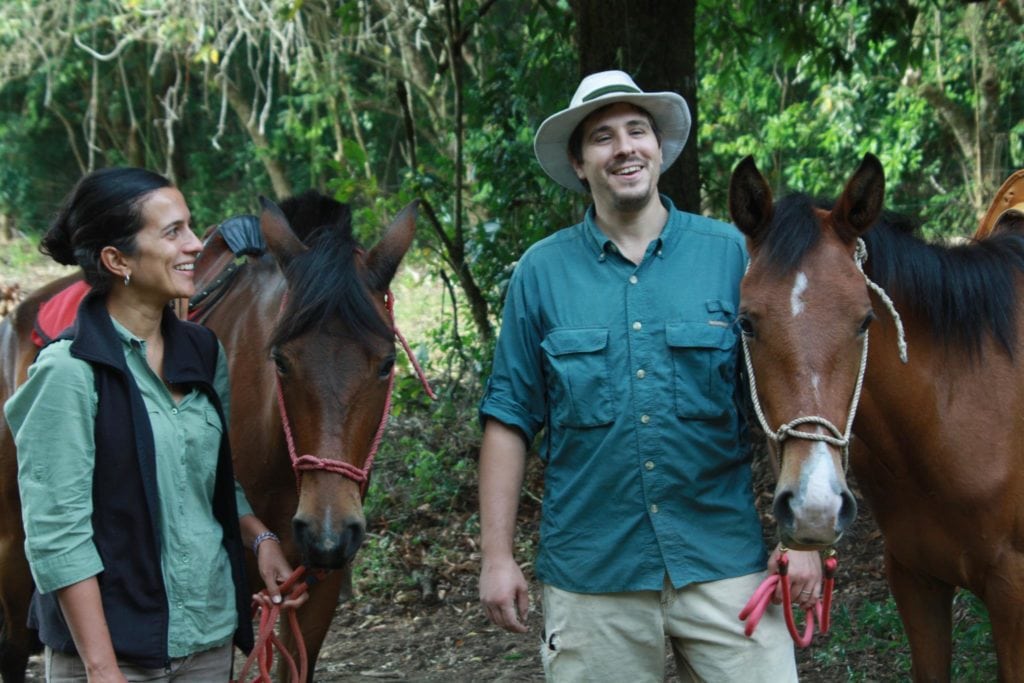Conservation Ecology and Sustainable Development alumni have gone on to careers in academia, NGOs, government agencies, and the private sector. In honor of the CESD program’s twentieth anniversary, we’re checking in with some of them to find out what they’re up to nowand how the program has influenced them.
Q: What is your current job title and what do you do?
Justin: I’m the Executive Director of the Monteverde Community Fund.
We are a “grass-roots” organization that catalyzes local ideas on sustainability into tangible action. We work with community investors to create seed funding for projects, we support the development of larger initiatives with far-reaching implications for the region, and we facilitate opportunities for networking and peer-to-peer learning.
Q: What has been your career path, from leaving UGA to where you are now?
Justin: When I graduated from the CESD program in 2006, I first worked as a teaching assistant for the UGA Costa Rica Tropical Ecology Program. Afterward, I provided consulting work for the University of Costa Rica, the Monteverde Biological Corridor Council and the UGA Costa Rica campus on projects related water and land conservation.
In 2008, I began working with the Monteverde Institute as coordinator for the Integrated Water Resources Program where we started a citizen-led stream monitoring program and courses related to watershed management. As the Institute’s overall Community Programs Department grew, I advanced to Department Director where I supported program coordinators in project design and resource development, in addition to serving as liaison to the Biological Corridor Council, the Municipal Commission for Integrated Waste Management and the Ministry of Environment’s Regional Council for the Arenal-Tempisque Conservation Area.
Through these experiences, I learned a lot about citizen participation and grass-roots development processes. At the same time, I saw a huge need for capacity-building around project development and management, cultivating collaborative partnerships and mobilizing new resources. In 2012, a work group and I combined these concepts with a pilot initiative that was facilitating more strategic community investments by the tourism sector, titled “Monteverde Travelers’ Philanthropy”, to create a new autonomous organization called the Monteverde Community Fund.
Q: How did the CESD program impact that journey?
Justin: The CESD program was instrumental in that it gave me the opportunity to interact with people from a variety of disciplines such as policy, governance, ecology, forestry and agriculture. This experience still proves useful for me today as I speak with government representatives, leaders in non-profit organizations, farmers and business owners, trying to understand the lens through which they see the world, and finding the common objectives that can unite them around complex issues.
The other valuable element of the CESD program was its practicality and emphasis on real world situations. The design of the core courses, which challenges students to analyze conservation problems within unique contexts, apply problem-solving skills and defend one’s own ideas, was an invaluable experience for me.
Q: What are some favorite CESD or Odum School (or Institute of Ecology) moments?
Justin: Definitely First Friday and the Annual Chili Cook-off! Not because the beer was always cold or the chili somewhat edible, but because it gave students the opportunity to interact with peers and professors on a level playing field. This was great for learning networking skills and for seeing people at their most human level (tongue in cheek), which is really where most business gets done.
Q: What is the most pressing conservation need you or your organization face and how might we best prepare our CESD students to meet that challenge?
Justin: (1) Biological connectivity and sanitation in the built environment, (2) efficient water use, (3) climate change and (4) landscapes dominated by industrial agriculture. Because all of these issues transcend the mission or capacity of a single organization, and will require significant resources to address them, I think it is critically important for students to practice the art of unlocking human, technical, financial and political capital through stakeholder consultation and partnership building. Negotiations, leveraging and trade-offs are also important concepts for young professionals to master in order to lead real world conservation and sustainable development initiatives.
Q: Did you create the position you are in now and if so, how?
Justin: The organization I work for, and the position I hold, did not previously exist. With the support of many community members, seed funding from key underwriters and a lot of “heavy lifting”, we were able to create what we have today.
Q: Do you have any general advice for CESD students? Any advice regarding job opportunities specifically?
Justin: Get off your iPhone! Don’t lose that ability to connect with people and the environment around you. Your jobs will require you to be inside a lot, so always work to rekindle that love you have with the natural world that you are working so hard to protect. Travel, go for a hike, meet outside, whatever, but don’t become detached from the actual thing that drives your career, and remember that dealing with people in the process is essential to accomplishing your goals.

